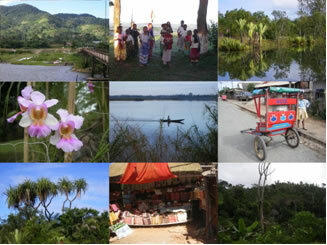An African country located in the Indian Ocean, Madagascar is the fourth largest island in the world. It has 18 ethnic groups, with a predominant influence of Malayopolynesians, former Asian colonizers.
Agriculture is the main economic activity in the country, whose highlight is the export of coffee, cloves and vanilla. The majority of the population resides in rural areas (70.18%).

Madagascar
The geographic isolation of the island favored the development of unique species of flora and fauna: most of the mammals and plants and half of Madagascar's birds do not exist anywhere else on Earth, that is, they are species endemic. However, in recent decades, predatory practices on the environment have caused intense destruction and threatened the existence of several species.
The country gained its independence in 1960, after years of battles with the French army. In 1972, a military coup imposed communism as a political system. Captain Didier Ratsiraka assumed the presidency of the country in 1975, installing a dictatorship that lasted seventeen years.

Madagascar Coat of Arms
Madagascar data:
Territorial extension: 587,041 km².
Location: Africa.
Capital: Antananarivo.
Climate: Tropical (mostly) and arid tropical (extreme south).
Government: Parliamentary Republic.
Administrative division: 6 autonomous provinces subdivided into departments.
Languages: French and Malagasy.
Religion: Christianity 49.5% (Protestant 25.7%, Catholic 23%, other 0.8%), traditional beliefs 48%, other 2.2%, no religion 0.3%.
Population: 19,625,030 inhabitants. (Men: 9,771,243; Women: 9,853,787).
Ethnic Composition: Indigenous ethnic groups 98%, (main: merina 15%, betsimissaracas 9%, betsileus 7%, tsimihets 4%, antisacas 4%), Comoros, Indians, Pakistanis, French and other 2%.
Demographic density: 32 inhabitants/km².
Average annual population growth rate: 2.83%.
Population residing in urban areas: 29.82%.
Population residing in rural areas: 70.18%.
Undernourished population: 37%.
Life expectancy at birth: 58.8 years.
Households with access to drinking water: 47%.
Households with access to a health network: 12%.
Human Development Index (HDI): 0.435 (low).
Currency: Ariary.
Gross Domestic Product (GDP): US$7,417 million.
GDP per capita: 377 of US$.
External relations: World Bank, IMF, WTO, UN, AU.
By Wagner de Cerqueira and Francisco
Graduated in Geography
Brazil School Team
countries - geography - Brazil School
